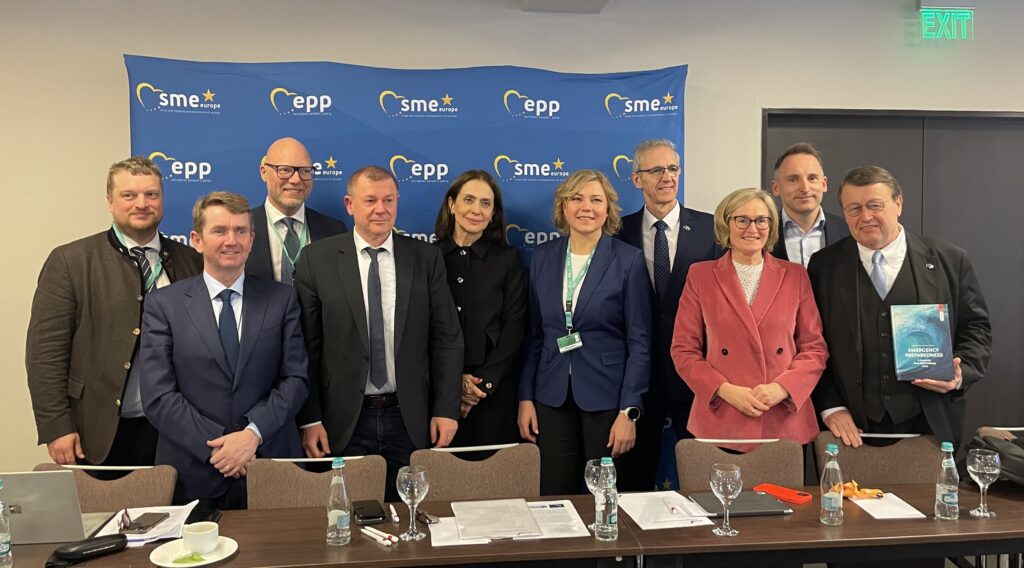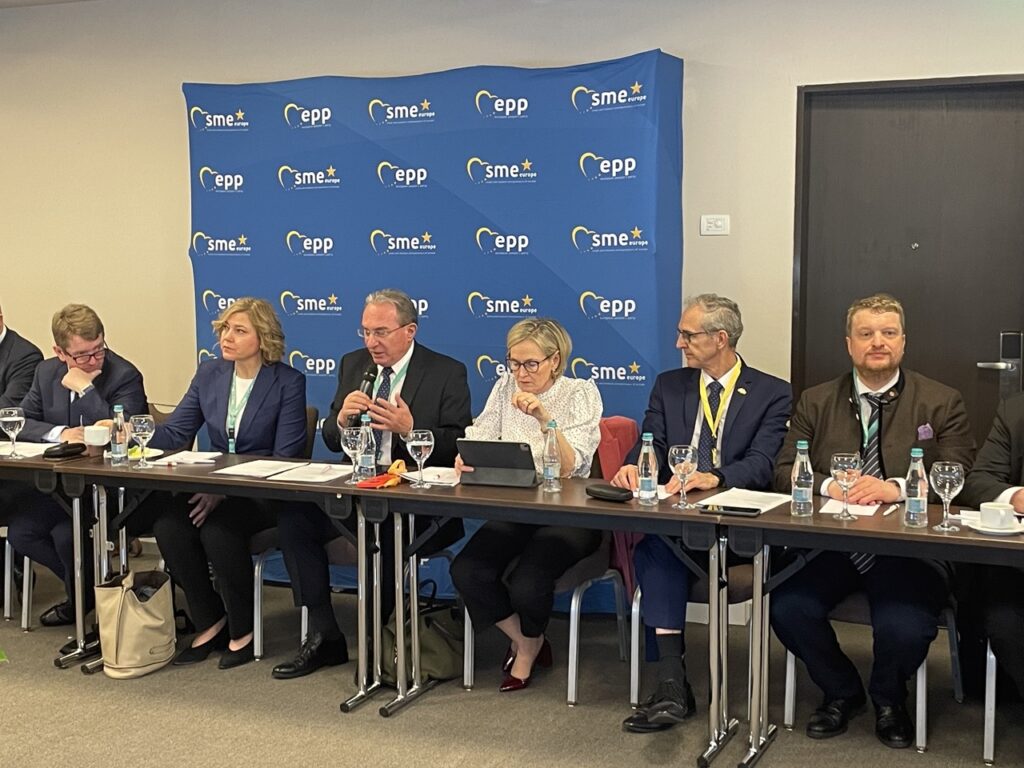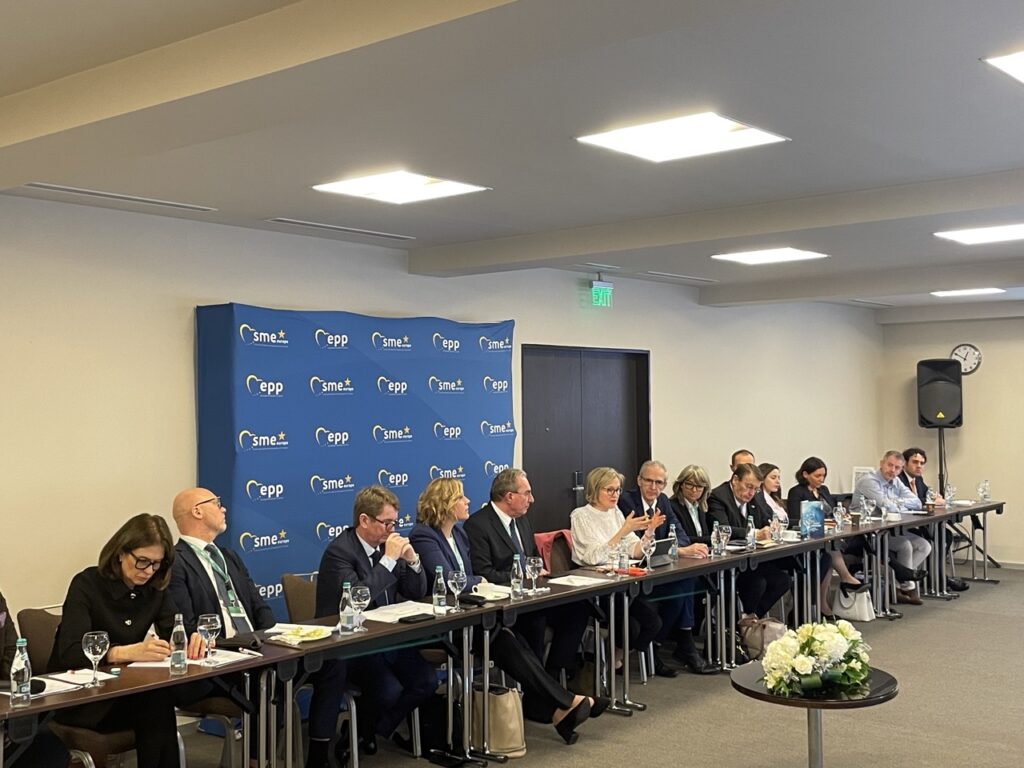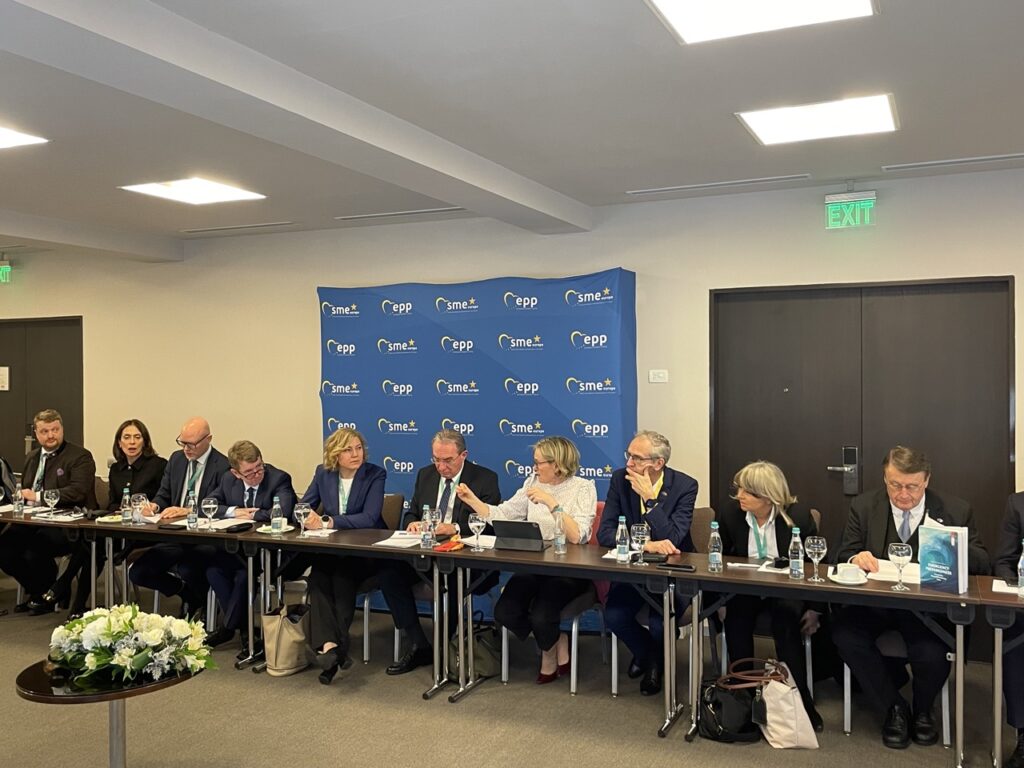Energizing the European Economy: Breaking Through Bureaucratic Barrier for Enhanced Competitiveness and Economic Growth

On Wednesday, March 6th, SME Europe of the EPP organized a discussion accompanying the EPP Congress 2024: „Energizing the European Economy -Breaking Through Bureaucratic Barrier for Enhanced Competitiveness and Economic Growth“. The event, hosted by our President Ivan ŠTEFANEC MEP and our First Vice-president Iuliu WINKLER MEP and moderated by Dr. Horst HEITZ, Secretary General and Executive Director of SME Europe, was enriched by the presence of several politicians and board members of SME Europe: We were delighted to welcome Mairead MCGUINNESS, Member of Fine Gael and European Commissioner for Financial Services, Financial Stability and Capital Markets Union, Markus PIEPER MEP, Designated EU SME Envoy, Henna VIRKKUNEN MEP, Co-Chair of the SME Circle of the EPP Group, Cllr Michael MURPHY, EPP-CoR Group Vice-President, Dr. Paul RÜBIG, Honorary President of SME Europe, Nadezhda NEYNSKY, Honorary President of SME Europe as well as Sunčana GLAVAK MEP, Vice-President of SME Europe and Jörgen WARBORN MEP, Vice-President of SME Europe.
In their welcoming remarks, Ivan STEFANEC MEP and Iuliu WINKLER MEP were thanking all speakers and attendees of the event for travelling the long way to Bucharest where the discussion was held. Connecting to the country the event took place in, they were putting focus on the still existing economic gap between eastern and western Europe regarding SMEs. For Mr. Winkler, SMEs in eastern European countries do not find themselves in such an economic depth as their western pendants looking at the “Mittelstand” in Germany for example. He adds that free trade is the key factor to follow the target of advancing the transition between East and West in Europe.

In relation to the keyword “transition” Commissioner Mairead MCGUINESS mentioned the importance of competitiveness and sustainability for SMEs. Both factors should rather complement each other than clashing especially when it comes to the field of energy politics. Ms. MCGUINESS continued her speech denouncing that a lot of the current problems concerning SMEs are having their origin in several crisis of the past years like the Covid Pandemic or the ongoing Ukraine war: Geopolitical tensions lead to different gaps when it comes to the right education of staff no matter what industry they are part of.
Markus PIEPER MEP started his speech by seizing several positive notes on recent economic conditions concerning bureaucracy in the EU: The common market with open borders, the common currency and the harmonization of practical standards all help to “cutting red tape” (tearing down bureaucratic burdens). As the designated SME Envoy of the European Commission Mr. Pieper highlighted the importance of small and medium sized companies while 40 percent of the export success of the EU belongs to enterprises with less than 250 employees. But still there are too many regulations, too many subsidies and too much taxonomy that are inhibiting the freedom of SMEs and turning the EU advantages into opposites. To overcome these problems Mr. Pieper is suggesting different solutions such as a digital tool to discover double regulations to decrease the amount of bureaucracy int the EU.
In her role as the chair of the SME Circle of the EPP Henna VIRKKUNEN MEP pointed out that one of her main tasks is that legislation should not only be shaped on the needs of bigger companies. Rather than the status quo there should be more inclusion of the matters of small and medium sized enterprises forming 99 percent of all companies in the European Union. Furthermore, she welcomes the developments on the abolition of bureaucracy in the new manifesto of the EPP with several mechanisms such as the “one-in-two-out” rule on bureaucratic burdens.
For Cllr Michael MURPHY, being Vice-president of the CoR of the EPP-Group, it is a central issue to contribute for a better law making within the EU incorporating not only the urban regions. The Committee of Regions is a bridge between Brussels and the EU territories with the target to protect and strengthen the local markets: Spend local, invest local, think local – these were the keywords of Mr. Murphy marking the importance of smaller regions. Therefore, he is proposing for example better access to finance and capital markets for SMEs from rural areas.

For time reasons, Sunčana GLAVAK MEP just made a short comment on the topic of the debate addressing the underestimated harmonization between education and the lack of employees within the EU. Especially when it comes to prepare new generations for the job-related challenges, it will be important to incorporate digital tools and artificial intelligence right from the beginning.
Continuing the discussion, Jörgen WARBORN MEP began his speech with an interesting illustration of the effects the regulatory burdens are having on the EU: Mr. Warborn was filling up two glasses of water – one was symbolizing the economy of the USA in 2004 and one was symbolizing the EU in the same year. Afterwards, he continued to fill up both glasses while the “EU-glass” just received a bit more water and the “USA-glass” was filled up much more showing that there has been a massive difference between the economic growth of the USA and of the EU until 2024. The example shows that it should be a main target for the upcoming EU legislation to revive the competitiveness by decreasing bureaucratic burdens: Using the “one-in-one-out”-rule on regulations the Commission of the EU is already going into the right direction. In order to make it more effective, Mr. Warborn is suggesting a stronger use of impact assessment on these processes. For example, this could reduce the reporting costs up to 25 percent.

Being a long time MEP and having a lot of experience with SME politics, Dr. Paul RÜBIG is adapting to the point of assessment in terms of better consultation in-between the EU institutions when it comes to risk management of regulations. This could have an immense effect on reducing the costs for consumers indirectly and strengthen the competitiveness of the EU outwards.
Closing the debate, Nadezhda NEYNSKY was putting her focus on the necessity of a safe environment as a basis to reach the targets which are set for SME politics. In detail, Ms. Neynsky means the ongoing geopolitical crises with the Ukraine war above all. The actors of the EU such as the institutions as well as the democratic parties need to send clear and strong messages concerning dependencies on Russia or China but also the upcoming elections in terms of nationalist parties. Therefore, she admonished that the EU has to be very careful.

